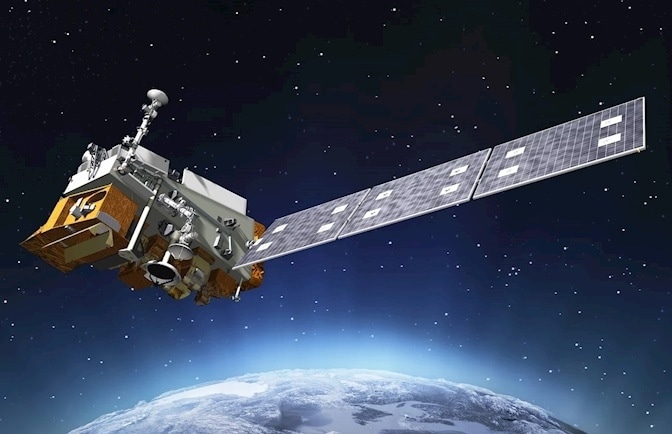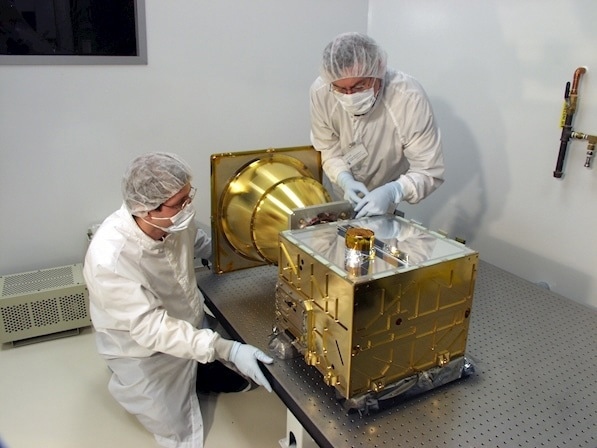Space has captivated man for centuries - from fantasies of aliens attacking earth to the emerging reality of humans ultimately setting foot on Mars.
ABB’s participation in space technologies began in the mid 1980s. Since then, it has been involved in more than 50 space programs across the world. ABB’s optical measurement systems are presently orbiting the Earth measuring ozone levels, greenhouse gas emissions and forecasting weather patterns.

Image Credit: NASA
Instruments produced by ABB help in better understanding the Earth’s atmosphere, which is fast being altered by human-generated and natural emissions. They also provide superior quality data, which can be examined to enhance the accuracy of weather forecasting and predict the impact of climate change and rising temperatures.
Fourier Transform Spectrometers (FTS)
Global warming effects include more frequent, strong hurricanes and rainstorms. Extreme weather conditions can be hazardous major regions of the world. ABB’s Fourier Transform Spectrometers (FTS), manufactured by ABB’s Measurement & Analytics Business Unit in Quebec City, is a robust tool for measuring properties of light across a specific portion of the electromagnetic spectrum. This technology can detect molecular “fingerprints,” which are essentially the types of chemical bonds in a molecule.
For any specific bond, there are several definite frequencies at which a molecule vibrates. This is the “fingerprint” that ABB’s technology identifies and can provide a quantitative or qualitative measurement. Such measurements can be applied to precisely measure water vapor concentrations and temperatures in the atmosphere, and use them to feed weather predicting models.
ABB’s FTS instruments can be used with low orbit as well as geosynchronous satellites at an altitude of 36,000 km. Depending on the orbit, such instruments need variable degrees of sensitivity to exactly measure the atmosphere. FTS technology is powerful and very reliable, making it suitable for long-term operational missions.
ABB’s Measurement and Analytics business will supply three infrared calibration sources to Airbus Defense and Space in Germany for the METOP-SG “A” satellites. The instrument is a multispectral imaging radiometer that will produce data about the Earth’s surface, clouds and aerosols. Meteorologists on the ground will apply the data for more accurate weather forecasts. Researchers will be able to construct better models to understand the influence of greenhouse gases on global warming. ABB’s instruments will be on board all future European weather satellites presently under development, for a total of nine extra satellite optical systems.
The Measurements and Analytics team in Quebec City has developed proficiency in manufacturing sensitive spectrometers for weather satellites. The team has partnered on instrumentation projects with NASA’s Jet Propulsion Laboratory, the Japanese Aerospace Exploration Agency and the Canadian Space Agency (CSA). ABB’s calibration systems, which were initially developed in the late 1990s, are still successfully operational on satellites on-orbit.

Image Credit: ABB Ltd.
ABB’s Role in Future Space Missions
ABB’s expertise with weather satellites places it in a powerful position to participate in mankind’s boldest attempt: putting a man on Mars. The FTS technology was initially built to observe space and later found its way into a complete range of other applications.
- Mars has historically been hostile to humans’ efforts to reach it, with almost half the attempts failing to reach there. Some of these failures occurred because Mars was the first planet humans tried to explore, and important lessons were gained over the years. In the last twenty years, important progress has been done, with four orbiters and landed missions providing spectacular images of Mars as a world that looks like the Earth, having a complex geological history.
- Presently, several space agencies and private companies are searching ways to launch the next big step: sending humans to the planet and build colonies.
- These projects will require solutions that ABB has solid expertise in. Under a contract with Canadian Space Agency, ABB has developed instruments for a Mars mission to detect the existence of molecular life. In future, when humans make it to the red planet and start construction a colony, controlling the quality of air will be of supreme importance. ABB makes analyzers that are extremely powerful tools to monitor the safety of air. ABB’s robust solutions for digital connectivity and energy efficiency will be required on the way to Mars and after humans land there.
ABB has a critical role to play in the future of space exploration, utilizing its prominent role in the Energy and Fourth Industrial Revolutions. Such technologies are just another intriguing example of how the company is leading the way into the future. ABB has the required infrastructure, including eight cleanrooms and NASA certified labs, to develop space hardware.
ABB’s expertise in the design and manufacture of space equipment will carry on providing early warning of climate change-related hazards. They will enable space agencies to reach Mars, where future probes could discover evidence of life. As humans expand their presence into the solar system, ABB’s instruments will have a crucial role to play in future explorations, which could reveal the long-standing mystery of whether there is life outside Earth.

This information has been sourced, reviewed and adapted from materials provided by ABB inc Space Defense Systems
For more information on this source, please visit ABB inc Space Defense Systems.